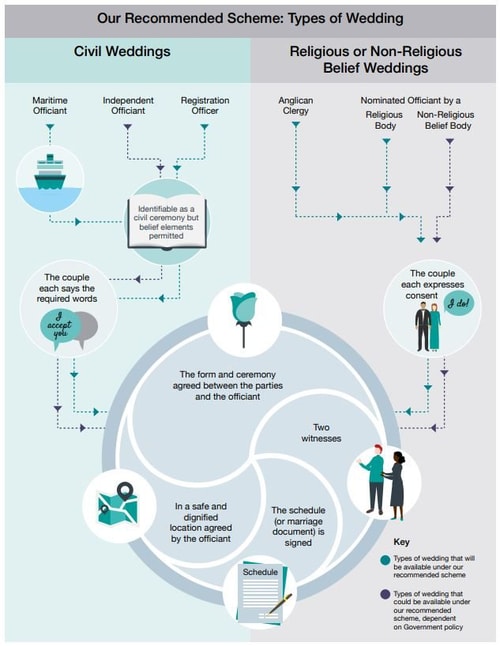On 19 July, the Law Commission set out its proposals to reform an "outdated and restrictive" weddings law in England and Wales. In this briefing, we go through the recommendations made to government and analyse, if implemented, the options available to churches and engaged couples.
In summer 2019, the UK government commissioned the Law Commission to “provide recommendations that allow for greater choice within a simple, fair and consistent legal structure”. A year later, the Law Commission published its consultation paper, hosting online conversations, roundtables and inviting civil society to respond to questions about wedding ceremonies and the legal requirements.
You can read our consultation submission here.
The Law Commission’s 471-page report, complete with 57 recommendations, is now with the government to consider proposals and give an official response. In the next six months, we expect an interim response followed by a full response within a year. Should the government wish to implement all or some of these changes, the next step would be to draft legislation and introduce a bill into parliament.
Weddings law in England and Wales is difficult to navigate
Under the Marriage Act 1949, there are different rules to legalise a wedding depending on the choice of ceremony. Under the current law, couples must first decide on the type of wedding, civil or religious wedding. If they decide they would like a religious wedding, then different rules apply depending on the type of wedding: Anglican (Church of England or the Church of Wales), Jewish, Quaker, and any other religious group.
At present, a registered building is essential to legalising either a civil or religious wedding. Currently, all civil weddings must take place in either a registered office or, in select cases, approved outdoor premises. Whereas, all religious weddings must take place in a registered place of worship, signed off by the governing authority of that religion and the General Registration Office and additionally approved for conducting wedding services. In short, the process has subtle yet significant variations in the rules and can be difficult to navigate for couples.
From the outset, our engagement has been to demonstrate the challenges couples and different denominations outside the Anglican tradition face in legalising weddings, whilst pressing the importance of marriage. It is our view that churches should be able to conduct wedding ceremonies that are in line with their beliefs around marriage and that this should not be undermined by proposed changes.
A shift from a building-based to an "officiant-based" scheme
The key recommendation from the Law Commission is “to shift the focus of regulation from the building or venue where weddings can take place, to the officiant.” Under this scheme, every wedding would have an officiant in attendance who would carry out the same legal duties regardless of whether it is a civil or religious ceremony.
Of significance to churches in our membership outside of the Church of England or the Church of Wales, this scheme would make it possible for their church governing authority to nominate an individual to legally officiate and conduct a wedding. This would particularly benefit churches that do not have a permanent place of worship.
The concept of an officiant-based scheme is not new and reflects weddings law changes made in Scotland, Northern Ireland, Ireland, Jersey, and Guernsey several years ago.
The Evangelical Alliance welcomes the report and is encouraged to see several proposals of ours inform the Law Commission’s recommendations. The most noticeable is the freedom to conduct weddings in keeping with religious convictions and traditions. For couples and evangelical churches, it would become possible to have a wedding ceremony celebrating the beliefs of the denomination on the premises of the couples’ choosing and for that wedding to be legally recognised.

Equality law and religious weddings
Marriage or civil partnership, religion or belief, sexual orientation and gender reassignment are protected characteristics in the Equality Act 2010. This means no individual with one or dual characteristics should experience discrimination based on that characteristic.
In chapter 8 (page 276) it sets out how under the Law Commission’s proposed scheme, religious organisations and/or officiants nominated by a religious organisation can continue to exercise their freedom not to officiate a same-sex wedding or wedding involving transgender people. These “special provisions” are recognised and written within both the Marriage Act 1949 and Marriage (Same Sex Couples) Act 2013.
Specifically, it would be the responsibility of the governing authority for that religious group to opt in to officiate same-sex weddings and even if they had, religious officiants could not be forced to officiate a same-sex wedding against their wishes. Consent is crucial. Put another way “the law will continue to ensure that no person could be compelled to conduct, be present at, carry out, otherwise participate in, or consent to a religious same-sex wedding, where the reason was that the wedding was of a same-sex couple.”
It will be important that if this proposal is placed into law, that it is explicit that churches that do own their building are not compelled to host same-sex wedding services with an officiant from another body that is willing to conduct them.
The report is also clear that this “special provision” does not extend to registration officers that work for a public body, irrespective of personal religious convictions. This, it argues, is because the “state has legitimate interest in protecting the rights of same-sex couples and transgender people.”
The other proposal worth noting is the recommendation for the General Register Office to make publicly available a list of nominated officiants, including religious officiants who opt in or out of officiating same-sex weddings. In our consultation submission, we questioned the need for this list. We raised concerns that individuals opposed to a churches’ position on same-sex marriage may misuse the personal information of church leaders or attendees, potentially placing them at risk of harm. We are saddened by the Law Commission’s decision to overlook these concerns.
There is a lot for churches, leadership teams and trustee boards to consider. In the interim, our advice to member churches is to prayerfully consider what is best for your congregation and context. Nominating individuals within your church to officiate weddings has many benefits, but it is important to consider that this also comes with administrative demands and for the church to have a formal policy on what weddings they will be willing to conduct.
To support you in that, we will provide an update briefing once the government has clarified its intent on reforming weddings law in England and Wales.



